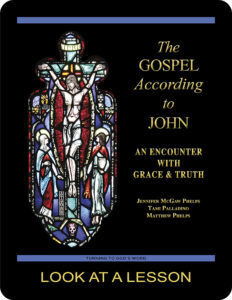that, because & since
 The First Letter of John 3:2 (NABRE) is a fascinating verse that hints at our future relationship with God in the statement: “We do know that when it is revealed we shall be like him, for we shall see him as he is.” This is an especially interesting phrase because the New Testament contains relatively few hints about the future of the Church and the end times.
The First Letter of John 3:2 (NABRE) is a fascinating verse that hints at our future relationship with God in the statement: “We do know that when it is revealed we shall be like him, for we shall see him as he is.” This is an especially interesting phrase because the New Testament contains relatively few hints about the future of the Church and the end times.
This also is one case where the translation of a conjunction is extremely important to the meaning. In the original Greek text, the conjunction translated as “for” is ὅτι (hoti), a word that typically means such things as “that,” “because,” or “since.” With those meanings, there’s a clear causal implication in the text that we will be like God explicitly because we will see God as he is. The choice to translate the conjunction as “for” in both the Revised Standard Version and the New American Bible softens this meaning and connection. Some other translations soften it even further.
From the Greek text, the key idea is clearly that seeing God as he is is the primary contributing factor in our becoming like God. This notion contains important implications not just for the end times but for us today. Does it likewise hold true that the more we come to know and see of God even now, the more we come to resemble him? If this is something that works by degrees, the the more we can see of God, the holier we will be.
you also may like our study of the Gospel According to John
 The Gospel According to John: An Encounter with Grace & Truth, a 25-lesson Catholic Bible study with an imprimatur, examines the Fourth Gospel’s view of Jesus Christ as the Son of God, with special emphasis on the institution of the sacraments of the Church as the means by which Christians are purified and made holy. This recently revised study includes maps and additional commentary, and takes a closer look at the way in which Jesus relates to individual men and women. Click on the book’s cover to view a sample lesson.
The Gospel According to John: An Encounter with Grace & Truth, a 25-lesson Catholic Bible study with an imprimatur, examines the Fourth Gospel’s view of Jesus Christ as the Son of God, with special emphasis on the institution of the sacraments of the Church as the means by which Christians are purified and made holy. This recently revised study includes maps and additional commentary, and takes a closer look at the way in which Jesus relates to individual men and women. Click on the book’s cover to view a sample lesson.
 Click on the picture of the statue of Moses with horns (above) to learn more about Lost in Translation. A new entry is archived each Monday. Contact us to receive Lost in Translation by email every week. You may use any of the contact links on our website to ask Matthew a question.
Click on the picture of the statue of Moses with horns (above) to learn more about Lost in Translation. A new entry is archived each Monday. Contact us to receive Lost in Translation by email every week. You may use any of the contact links on our website to ask Matthew a question.
